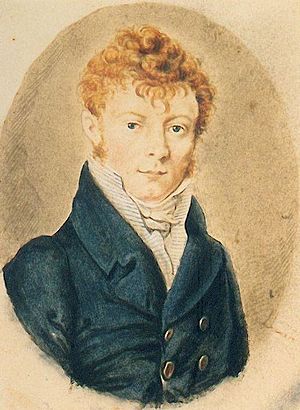Johann Karl Ehrenfried Kegel facts for kids
Johann Karl Ehrenfried Kegel (born October 3, 1784 – died June 25, 1863) was a German expert in farming, also known as an agronomist, and a brave explorer. He is famous for his travels to the far-off Kamchatka Peninsula in Russia. Kegel passed away in Odessa in 1863.
Contents
Early Life and Education
Johann Kegel was born in a place called Rammelburg, which is now part of the town Mansfeld. He went to school and studied in Copenhagen, a city in Denmark.
Journey to Kamchatka
In the winter of 1826 and 1827, Kegel traveled to Saint Petersburg, a big city in Russia. In 1841, the Russian government asked him to go on an important mission. They wanted him to explore the Kamchatka Peninsula. His job was to find out if the land was good for farming and if there were valuable minerals to dig up.
Kegel's journey was very long and difficult. He traveled across Siberia, a huge region in Asia. Then, he got on a ship in a port called Okhotsk. Sadly, his ship was caught in a storm and he ended up shipwrecked when he finally reached Kamchatka.
Exploring the Land
Once he arrived in Petropavlovsk, the main city in Kamchatka, Kegel began his work. He took many long trips, sometimes lasting several months, deep into the country. He wanted to study the soil and try planting different crops to see what would grow.
Traveling during the summer was extremely hard. The paths were often muddy and almost impossible to use. Despite these challenges, Kegel wrote detailed reports about everything he saw. He described the different plants and animals, the types of soil, and the geology (the rocks and land formations). He also wrote about the lives of the local people.
Kegel discovered many valuable mineral resources. He believed that Kamchatka could become a very rich place if its resources were managed well. He also suggested ways to make life better for the people living there and spoke out against unfair treatment.
Challenges and Legacy
Not everyone was happy with Kegel's work. Some local leaders were only interested in making money for themselves, especially from the fur trade. They did not want to see the country develop in other ways. When they realized Kegel was honest and could not be bribed, they tried to make his work difficult.
Even with these problems, Kegel managed to finish his important mission. He returned in 1847, but his health was very poor. His reports were the most accurate and detailed of that time. However, they could not be published while he was alive. Publishing them would have put his freedom, or even his life, at risk.
See also
 In Spanish: Johann Karl Ehrenfried Kegel para niños
In Spanish: Johann Karl Ehrenfried Kegel para niños
 | James B. Knighten |
 | Azellia White |
 | Willa Brown |


